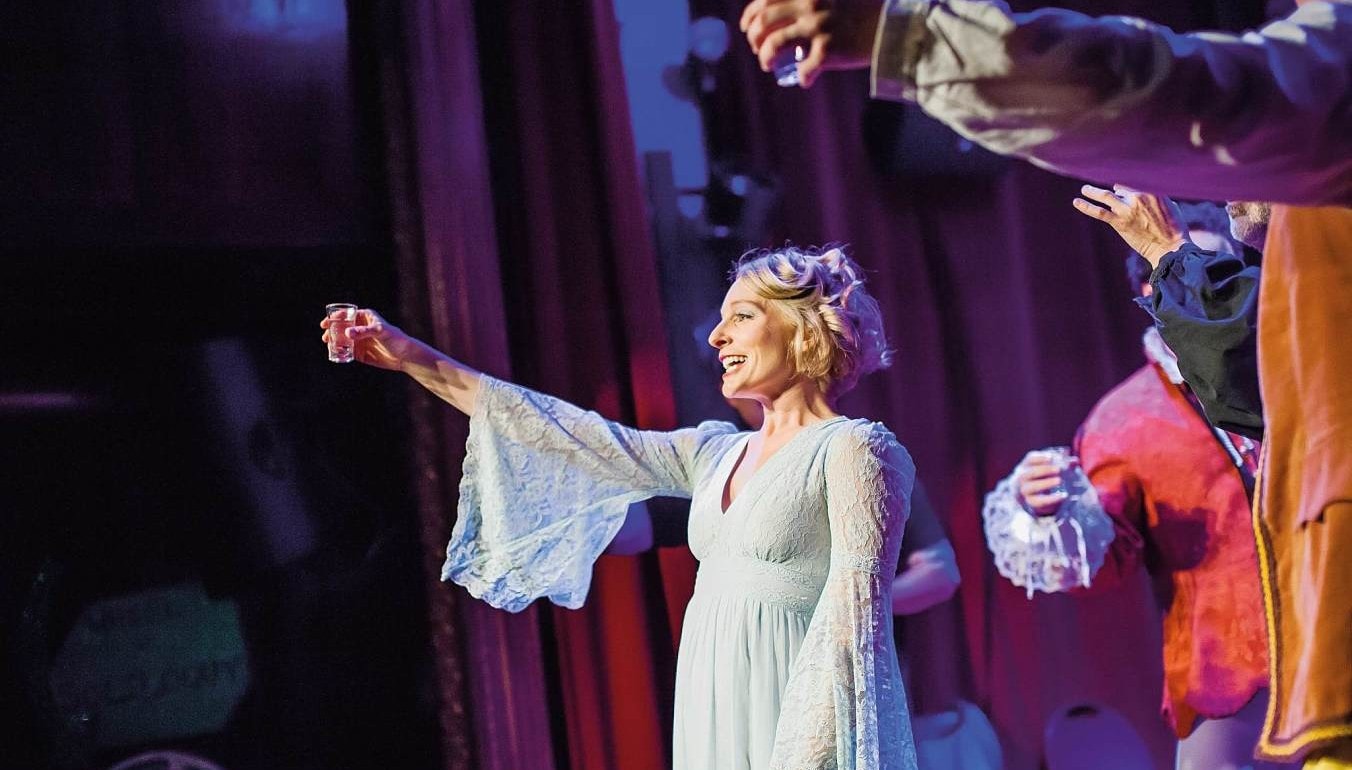Paranoid and believing Banquo has betrayed him, Macbeth launches into one of those famous speeches that it seems everyone knows: “You’re nothing to me now. You’re not a brother, you’re not a friend….”
Wait, what?
The line is from Michael Corleone’s famous kiss-off speech in The Godfather, Part 2, and interpolating it into Macbeth draws a big laugh—which is not surprising, since it’s in keeping with the overall production, and since many audience members are pleasantly buzzed by this point. This murderous pop-culture mashup is being performed in the lounge of New York’s Roy Arias Stages by a troupe called Drunk Shakespeare.
What is surprising is how common it has become to blend booze with the Bard: New York, Chicago, Los Angeles, San Jose, Charlotte, N.C., and Portsmouth, N.H., are just some of the places that are currently home to some variation on the theme that a shot full of alcohol helps the classics go down.
“I love Shakespeare, and was wondering how I could make his plays accessible to people who don’t love him,” says Matt Morgan, who founded Shotspeare in Los Angeles in 2011. “We were doing shows in bars, so I thought if I cut a Shakespeare play to a slot that a band would fit in, that would draw people. And if I added drinking games….”
The balance these companies strike between drinking and Shakespeare varies widely. In Shotspeare, the whole cast drinks, while in Drunk Shakespeare only one designated actor does, though both troupes go wildly off script. In the New York City–based group ShakesBEER, sober actors perform largely true-to-text scenes for drinking audiences along a pub crawl. At Atlanta Shakespeare Company’s Shakespeare Tavern, British pub fare is served before full-scale First Folio productions, complete with handcrafted costumes.
These disparate offerings do share common bonds, though, including a certainty that the groundlings—the poor folk crammed into the standing-room-only pit in Shakespeare’s time—would be able to relate.
“I’m pretty sure it was a heavy-drinking crowd at Shakespeare’s plays,” ventures Atlanta Shakespeare Company artistic director Jeff Watkins. As Samuel Taylor, cofounder of Chicago’s Back Room Shakespeare Project, wrote in a recent essay: “The audience Shakespeare wrote for was a bloodthirsty bunch of drunks who came for the bear-baiting and stuck around for the tragedy.”
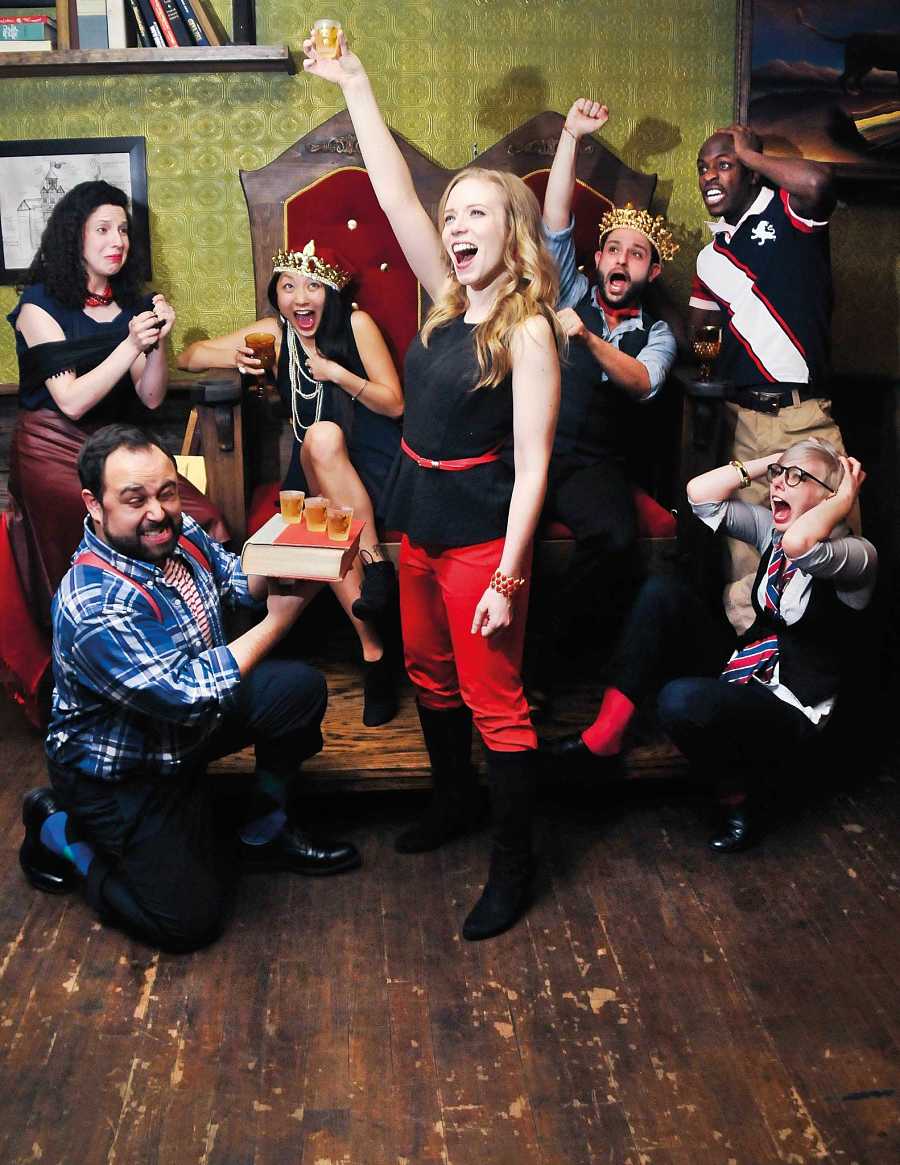
Beyond this historical inspiration (or rationalization, depending on your point of view), these sauce-and-Shakes mixers cite a desire to upend the default contemporary approach to theatre, especially to the classics.
“American theatre feels so fragile today,” posits Morgan. “There’s no food or drinks, and everything feels nice and clean and safe. We’re missing that sense that you can laugh and be loud.”
Chicago’s Taylor sees it this way: “Every convention of your average modern theatre serves to distance the audience from the play and from one another. When we try to jam Shakespeare’s plays into our modern theatres, when we make them follow modern rules, we alter them violently.”
Shakespeare has suffered more than modern playwrights from this conservative atmosphere, according to Lewis Ironside, whose Magnificent Bastard Productions in England gets right to the point with its “Shit-faced Shakespeare.” Says Ironside, “Shakespeare has become associated with a ‘worthy’ strand of educational culture that we’re meant to revere and honor rather than laugh at and simply enjoy.”
Says Ross Williams, founder of the New York Shakespeare Exchange, which runs ShakesBEER (in addition to mounting fully staged productions), “People who wouldn’t go to a theatre feel there’s less pressure on them in a bar.”
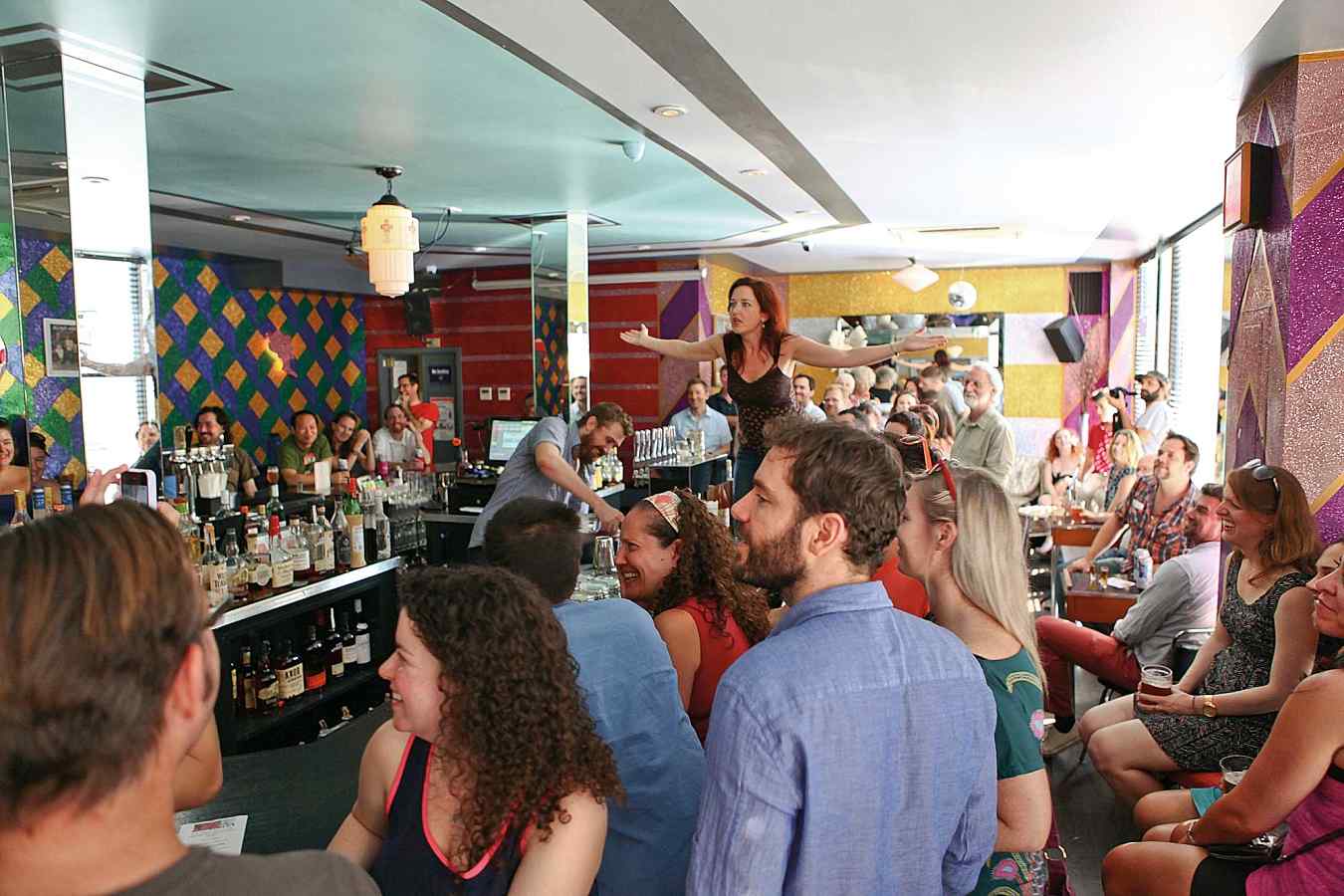
(Photo by Joe Schulz)
Dan Beaulieu, artistic director of Seven Stages Shakespeare Company in Portsmouth, which operates an outfit known as ShakesBEERience, agrees. “Shakespeare comes with a lot of inhibitions for both actors and audiences.” Drinks, and a casual social environment, can lower those inhibitions.
With some caveats, traditional Shakespeareans approve. “I’ve always prided myself on imbuing the Bard with heart and soul, but I never really thought about the liver until now,” quips Stacy Keach, who has played Hamlet, Falstaff, Henry V, Richard III and Macbeth. “I don’t think you have to be drunk to enjoy or perform Shakespeare,” the actor allows, but adds that “the groundlings were presumably the most important section of Shakespeare’s audience, and these gimmicks are certainly of that breed. If breaking down traditional barriers and having fun doing it is a goal, then what could be so bad?”
Watkins says that success requires both consistently great theatre along with the gimmick, though he emphasizes that “this is not dinner theatre, which would undermine the seriousness of what we are doing.”
Contemporary directors like Peter Brook and Jonathan Miller, Watkins continues, were once “rebelling against a musty Victorian aesthetic, but now their style has become the oppressive tradition.” He sees his theatre’s own “original practice” as one way to rebel.
And while his theatre takes its Shakespeare seriously, it’s also in earnest about its fundraising. Watkins has undertaken events like a staged reading of the popular mashup Two Gentleman of Lebowski, at which he says he “sold $1,600 worth of White Russians to people in bathrobes.” (The drink and the attire were favorites of “the Dude” in the Coen brothers movie that was one half of the evening’s inspiration.)
Michael Kahn, longtime artistic director of Shakespeare Theatre Company in Washington, D.C., largely approves, though he prefers audiences drinking to actors drinking (“I certainly hope there’s not a whole new generation who think the actors have to be drunk,” he says). His theatre allows audiences to bring drinks in “sippy cups” to their seats, and also does special “happy hour” gatherings like one during The Tempest that featured a silent-comedy movement troupe performing their own variation on the show.
Taylor and his Back Room Shakespeare Project, which started in 2011, also strive for authenticity, but with a unique twist. The Chicago outfit follows some less familiar Elizabethan traditions: There’s no director, and the actors not only costume themselves but oversee their own roles, including changing their lines on their own when they see fit. Back Room actors don’t rewrite Shakespeare, exactly, but they do have final call on scene cuts and how to play their characters—and all with only one rehearsal. Initially, Taylor says, he had to convince actors to try it, but now he has a list of 150 who want to take part.
The shows are staged in the back room of a bar, “a social space, so people understand their job is not to come in and shut up like they are taught to elsewhere in theatre,” Taylor points out. Still, Taylor doesn’t want drinking games disrupting the performance. So the Back Room company sets the tone beforehand, sharing toasts with the audience (excepting actors involved in fight scenes) and undertaking arm-wrestling, pie-eating and insult competitions. The audience votes afterward to award the best performers in categories such as clarity, authenticity and generosity. (The latter was added because, Taylor notes, “It’s really easy in a bar with 200 people to play for laughs and steal the focus instead of serving the play.” They used to give out negative awards too, but dropped the practice “after some truly painful moments,” Taylor recalls with a wince.)
In between, the Shakespeare is mostly played straight, albeit in pared-down form—Taylor generally aims for 90 minutes, though Back Room’s Hamlet was two hours and its Othello was two-and-a-half (because the lead actor “said I was out of my damn mind and added back in 20 minutes of his scenes”).
His Back Room audiences, Taylor says, far from being blurry or distracted by the atmosphere, are so engaged that they find Elizabethan English easy to understand. “What has been so life-changing for us is how hard they are listening,” he enthuses. “I had a big guy in a bank-teller shirt tell me he hadn’t seen a play in 15 years before coming to our Julius Caesar, but afterward he went to see Henry V at Chicago Shakespeare Theater.”
Others have similar tales, but Beaulieu, whose company does full productions each summer in a local park, says the impact is unclear, since these unusual approaches may simply underscore what audiences don’t like about traditional Shakespeare. At a recent ShakesBEER show, spectator Emily Casey told me she had avoided Shakespeare since falling asleep during Julius Caesar on Broadway, starring Denzel Washington. “This is a lot more relatable and accessible,” she says flatly. (Another draw was that the bars were in her Upper East Side neighborhood.)
That night I asked another patron, Jay Chung of Bayonne, N.J., if he’d consider attending a traditional Shakespearean production. His reply: “Hell, no! But if you introduce beer into the picture…this was a lot of fun.”
Beaulieu’s readings in Portsmouth do more than simply introduce beer—ShakesBEERience’s beer sponsors provide kegs each month and invite discussion on the nuances of the beers being served. And the cast employs an entire menu of drinks—in The Merry Wives of Windsor, the actor playing the doctor chose to drink a Manhattan, the priest selected wine and Anne Page drank Shirley Temples. Beaulieu admits, though, that occasionally his actors get “more buzzed than anticipated. If you get too shticky, you put Shakespeare and the story at risk.”
With all these Bard-and-booze offerings sloshing around, it’s possible that patrons may experience some brand confusion. NY Shakespeare Exchange’s Williams concedes that in New York people sometimes confuse ShakesBEER, in which only the patrons drink, with the fully lubricated Drunk Shakespeare. “We’d much rather the audience be doing the drinking than the actors,” he affirms. “Shakespeare requires clarity, and that’s difficult enough in a party atmosphere.” He even turned down an offer from Drunk Shakespeare to do cross-promotion, feeling “it would muddy our brand.”
There’s another kind of branding going on, too: the kinds of shows these troupes undertake. While ShakesBEERience, for instance, tackles readings of challenging works like King John and even King Lear (albeit in truncated versions), ShakesBEER, which does 15-minute scenes in each bar along a pub crawl, largely sticks to lighter fare like The Taming of the Shrew, Much Ado About Nothing and Falstaff’s scenes from Henry IV. Beyond choosing the best scenes, Williams says choosing the right bar is essential—he needs ceilings high enough and furniture sturdy enough for actors to climb on, and bars must close their windows to block out New York City street sounds.
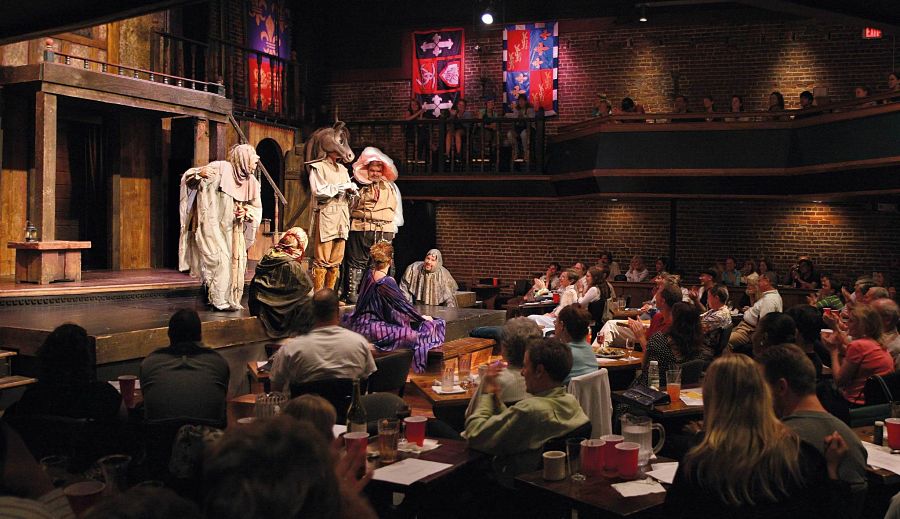
Still, because the bars are open to the public, there are inevitable distractions: “Jessie’s Girl” leaking out from the kitchen at the East End Tavern during As You Like It, or a pool game breaking out in the back of Ryan’s Daughter during Much Ado About Nothing. (That one led to a minor confrontation between the Shakespeare audience and the pool players.)
Still, plenty of non-ticket-buyers are seduced by these performances.
“People put Shakespeare on a pedestal, but this shows that the language can be accessible, that it can be like two people in a bar,” contends actor Brendan Averett, who was superb as both Petruchio and Benedick in ShakesBEER’s Shrew and Much Ado, respectively. Eleanor Handley, equally dynamic as Kate and Beatrice, says the pub crawl is special because “we’re not performing for the groundlings—we’re performing amongst them. It’s like everyone gets a personal show.
“The first time it was terrifying, but afterward I wondered how Shakespeare has been done any other way,” Handley continues. She pointed to the crowd at Five Mile Stone, many of whom were well into their cups when ShakesBEER showed up, but who still raptly relished a Shakespeare mashup called The Art of the Pick-Up (an anthology of lines from various Shakespeare plays and sonnets). “Without this type of performance you wouldn’t have all these strangers having animated conversations with each other.”
The first contemporary troupe to make the booze-and-Bard connection may have been a group that was a radical departure in another way: Sheila Proctor started Chickspeare in Charlotte, N.C., in 1998 because she wanted a chance to play what she felt were Shakespeare’s best parts—the male roles. After finding a space in a local brewery she realized “it was a great pairing.”
“We give them beer and put them at tables and put the show on around them in the whole space,” Proctor says. Chickspeare lasted until 2005. Then, in 2012, Proctor revived it under the new moniker ChicksBeer, partnering with NoDa, a local brewery. The new troupe performs shortened versions of the shows in the Reduced Shakespeare Company comic vein—the “foils” for the fight scene in A Quickie with Romeo and Juliet, for instance, are constructed from tin foil.
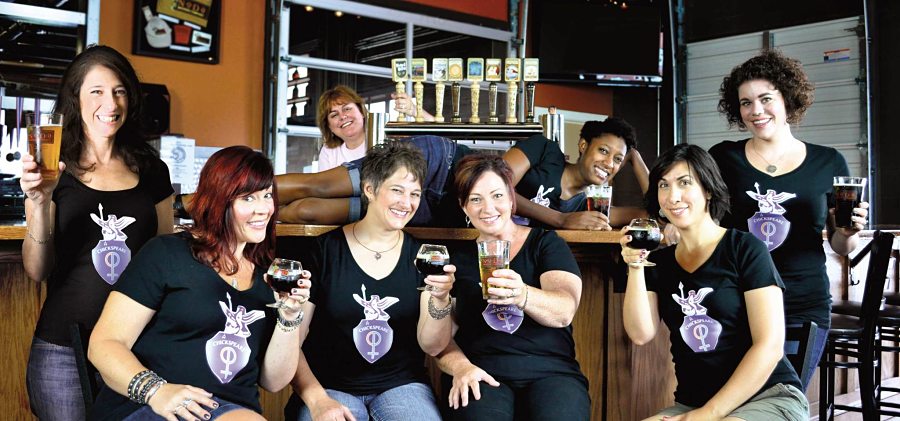
The drinking-and-declaiming idea caught on fast. England in 2010 saw the debut of Ironside’s Shit-faced Shakespeare, which nearly ended as soon as it had begun. The first show, at a festival, was an abridged A Midsummer Night’s Dream with the whole cast sober, except for one actress. Unfortunately, recalls Ironside, “She had rather too much too quickly and was unconscious backstage before we’d even finished Act 2. An ambulance was called and she spent the evening with a stomach pump and a team of medical professionals.”
He wanted to abandon the idea, but the whole cast wanted another go, and rumors that an actress had died drew 500 people to the second performance (the venue was designed for 200). “This time the fire brigade had to be called because of the crowds,” Ironside chuckles. Planning to bring his show to the Boston area in April, Ironside insists it is more than “Shakespearean bear-baiting,” and that apart from that shaky debut, the troupe’s performances are taken seriously.
Indeed, realizing that there is “fundamentally no fun in seeing somebody who’s too drunk to stand, speak, sing or samba in front of an audience,” Ironside’s group has since drawn up a “very, very long list of guidelines and rules which dictate the drinking—how much, how often and exactly in what manner people drink. Our actors are carefully put in a playful, naughty and thoroughly uninhibited state.”
(Incidentally, there is something of a Montague-and-Capulet feud between Ironside and Drunk Shakespeare founder Scott Griffin, with Ironside claiming that Griffin ripped off his concept, right down to the marketing. Griffin acknowledges the idea came from Ironside’s show, but says he made changes to the marketing and the script, and points out that his show, offered in a lounge, is different from Ironside’s, which is performed on a stage. Meanwhile, Williams claims that a group called Occupy Verona has copied his Shakespeare pub crawl idea in New York.)
Drunk Shakespeare’s take on Macbeth is one-third-to-one-half improv, with games—i.e, act out the next scene using pop-song lyrics—mixed in with Shakespeare’s actual words and bits lifted from movies like Independence Day. “It’s the most fun I’ve ever had,” declared a tipsy audience member, Elle Charles, at a recent performance. “They brought Shakespeare down for the layman, and with the pop culture they made it relevant.”
But a friend of mine, Eddie Rosenstein, said he felt the show was “neither fish nor fowl.” Tina Liu, the designated drinking actor for the night, played Lady Macbeth, and while she never missed a line, her most memorable contributions were as a rambunctious physical comedienne; Adam Smith played Macbeth, and apart from his foray into Corleone territory, he seemed to prefer a classical approach. “It took me a long time to come to terms with this,” says Smith, who delivered the “She should have died hereafter” soliloquy with a quiet urgency. “My No. 1 priority is telling the story.”
Still, the creators of these drinking-game shows say many Shakespeare aficionados are won over. “Purists come with a skeptical eye, but they buy into it because we’re honoring the original show,” says Shotspeare’s Morgan, even though his fast-paced Romeo and Juliet hits the balcony scene by page 12 and kills Mercutio by page 15. Along the way there may be puppets, dance numbers, a challenge game called the Wheel of Soliloquy, and scenes interrupted for more shots—Shakespeare Vodka is a sponsor.
While these liquor-and-verse purveyors expect to see imitators popping up around the country, what’s more significant is the influence these shows may have on traditional performances of Shakespeare.
“From acting in bars I’ve learned to love direct address on stage, and to find ways to be intimate and dynamic and still project,” says Averett, who also starred in the New York Shakespeare Exchange’s full-scale production of Titus Andronicus. Proctor says that when Chickspeare recently staged Twelfth Night in a theatre, they brought their club smarts with them—they set the show in a 1920s speakeasy, and NoDa was on hand to sell beer for audiences to take to their seats.
“These shows teach us that audiences want to interact, and that has spilled over to full productions,” believes Beaulieu. “People say, ‘Oh, you’re the ShakesBEERience people,’ and I used to take offense. Now I realize it’s a great compliment. That has become our flagship.”
Arts journalist Stuart Miller writes regularly for this magazine.

